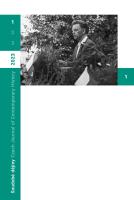Nacionalismus jako most do budoucnosti
Nationalism as a Bridge to the Future
The Ideology of Slovenian Communists after Tito (1980–1986)
Author(s): Michal JaníčkoSubject(s): History, History of ideas, Political history, Post-War period (1950 - 1989), History of Communism
Published by: AV ČR - Akademie věd České republiky - Ústav pro soudobé dějiny
Keywords: Slovenia;Yugoslavia;League of Communists of Slovenia (ZKS);nationalism;self-managed socialism;late socialism;Sloveneism;Yugoslavism;political liberalization;market economy
Summary/Abstract: The study analyses the ideological orientations of the Slovenian communist establishment in the 1980s, their mutual intersections and their significance in political practice. The author identifies five simultaneously present orientations: Sloveneism (Slovenian nationalism); Yugoslavism (Yugoslav federalism); self-managed socialism as a specifically Yugoslav variant of Marxism-Leninism; political liberalization; and later affinity to the market economy. Slovenian nationalism had the strongest position in the actions of the communist elite (League of Communists of Slovenia, Zveza komunistov Slovenije – ZKS). It was particularly concerned with maintaining Slovenia’s political autonomy according to the 1974 constitution but steadily gained strength, especially under the influence of public opinion. At the same time, the Slovenian communist leaders wanted to avoid a confrontation with the radicalized public and always ended up in harmony with it on a nationalist wave. In contrast to the “Sloveneists”, the “Yugoslavists” did not rely on identification with a united political demos but saw the meaning of Slovenia’s involvement in the common state mainly in the joint building of self-managed socialism and in the defence against external dangers. Although the appeal of self-managed socialism was weakened by the chronic economic crisis in Yugoslavia in the 1980s, leading Slovenian communists remained committed to its ideology. They also advocated supplementing self-management with market mechanisms and a limited liberalization of conditions, which, however, was not to imply the formation of other political parties. However, the communists in Ljubljana subordinated all their other ideological orientations to Slovenian nationalism in both rhetoric and practice. This was reflected in their smooth transition to the new political-economic system on the wave of national euphoria, which culminated in the declaration of Slovenianin dependence in the summer of 1991.
Journal: Soudobé Dějiny
- Issue Year: XXX/2023
- Issue No: 1
- Page Range: 99-137
- Page Count: 38
- Language: Czech

